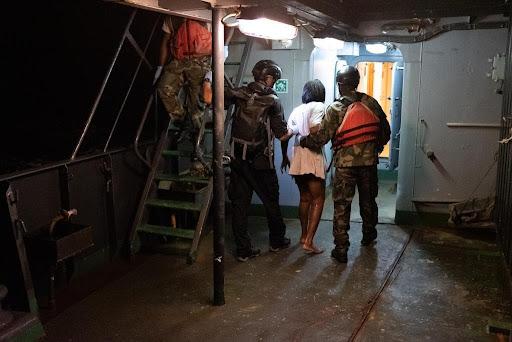Cutting Corners at the Expense of Precious Lives.

Rescued on boardNiko-Invako
What justifiable reasons can local WAEC authorities provide for its decision to dispatch WAEC Examination materials along with staff to administer the exams to Harper, Maryland on a leaky and unsafe vessel?
For the benefit of the public, the WAEC is a well-resourced institution capable of hiring private vehicles including air transport to convey its materials as well as staff to administer the exams. Clearly it is/was not the lack or non-availability of competent and capable carriers to convey the examination materials to Harper.
The Mission Air Services Inc., a private outfit, has regular flights to Harper and it also flies into other domestic airports around the country. Additionally, there are private vehicle rental services with mission vehicles capable of negotiating bad road conditions existing throughout much of rural Liberia.
Just why local WAEC authorities opted to dispatch staff and materials to Harper by sea at this time of the year, which is at the height of the rainy season when there were other viable options available, is something that beats the imagination.
From all indications, the ill-fated decision was motivated by greed by an inordinate desire for money. Since sea transport is far less costly, they decided to convey staff and materials by boat without even considering the risks involved in conveying such materials by an unsafe vessel.
As it stands, precious and valuable lives have been lost needlessly along with examination materials. This situation has placed students of Maryland and surrounding counties in a state of jeopardy, clearly because they will be unable to sit the examinations as scheduled.
The Ministry of Education also stands indicted because it seemingly abandoned its oversight role. Had the Ministry of Education provided effective oversight, it is doubtful whether it would have condoned the dispatch of WAEC materials by sea.
The Ministry of Transport, as well as the Liberia Maritime Authority, should carry an equal amount of blame for this tragedy. On what basis was this vessel certified as sea-worthy, capable of conveying passengers and freight to and from Harper to Monrovia, is the question begging for answers.
Moreover, why did each passenger not issue a life vest/jacket and why did the vessel not carry lifeboats aboard? Further it remains unclear whether the captain of the vessel did issue any order(s) to abandon ship. And if he indeed did so, was the crew instructed to ready the lifeboats and assist the passengers safely evacuate the stricken vessel and was he the last to evacuate the vessel?
These are hard questions demanding answers, especially in view of the current posture of the National Fisheries and Aquaculture Authority (NFAA), vis-à-vis artisanal fishermen eking out economic survival in the face of unfair competition from foreign fishing vessels.
They (NFAA) have on some occasions seized canoes and prevented fisher folks from going out to sea. This situation has led to shortages and scarcity and a hike in the price of fish on the local market.
As it appears, the enforcement of tax compliance measures outweighs any considerations about seaworthiness of these artisanal fishing canoes. Is there or are there any reasons why such commercial vessels are not subject to rigid seaworthiness checks?
Should the relevant authorities always wait for disaster to strike before they react? And why are such reactions, at best, lame duck, consisting of a virtual hodgepodge of lies and half-truths? The chief Maritime Commissioner, Eugene Nagbe, speaking in a radio interview, has declared that the owner of the vessel has been released from detention but that a criminal investigation has been launched into the affair with the view to bringing criminal charges against those responsible.
Judging from Chief Commissioner Nagbe’s responses to questions from journalists, it appears that he has already absolved his agency of any liability or responsibility for this tragedy, never mind assurances and promises of the launch of a criminal investigation.
Judging from the spate of public comments on the matter, it appears the public strongly believes that at the end of the day, after all the public rigmarole has died down, it will become business as usual. As a local rights advocate put it, “Money will talk and bullsh*t will walk”. Graham Greene on his travelogue of Liberia during the 1920s once commented “Liberia is a sick country; maybe one day it will get well.”
Liberia, over a century later, is still sick. But one day, maybe, it will get well; but just when is anyone’s guess.

